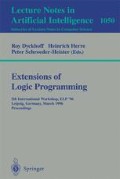Abstract
We introduce a new semantics for logic programming languages. It generalises the traditional Herbrand universe semantics, and specialises the semantics of logical relations, as used in analysing parametricity in functional and imperative programming languages. We outline a typed logic programming language, give it this semantics, and show how it supports structured development of logic programs as advocated by Sterling et al. In particular, it gives semantics for some dynamic aspects of logic programs.
The first author acknowledges the support of MITI Cooperative Architecture Project.
he second author gratefully acknowledges the support of EPSRC grant GR/J84205 Frameworks for programming language semantics and logic.
Preview
Unable to display preview. Download preview PDF.
References
Michael Barr and Charles Wells. Category Theory for Computing Science. Prentice-Hall, 1990.
A. Corradini and A. Asperti. A categorical model for logic programs: Indexed monoidal categories. Springer Lecture Notes in Computer Science. Springer-Verlag, 1992.
Andrea Corradini and Ugo Montanari. An algebraic semantics for structured transition systems and its application to logic programs. Journal of Theoretical Computer Science, 103:51–106, 1992.
Stacy E. Finkelstein, Peter Freyd, and James Lipton. Logic programming in tau categories. Manuscript.
James Harland and David Pym. The uniform proof-theoretic foundation of linear logic programming. In Proc. International Symp. on Logic Programming, pages 304–318. MIT Press, 1991.
Claudio A. Hermida. Fibrations, logical predicates, and indeterminates. PhD thesis, The University of Edinburgh, 1993. published as CST-103-93, also as ECS-LFCS-93-277.
Mark Kirschenbaum, Leon Sterling, and Ashish Jain. Relating logic programming via program map. Manuscript.
J.W. Lloyd. Foundations of Logic Programming. Springer-Verlag, second, extended edition, 1987.
D. Miller and G. Nadathur. Higher-order logic programming, volume 225 of Springer Lecture Notes in Computer Science, pages 448–462. Springer-Verlag, 1986.
A.J. Power and Leon Sterling. A notion of map between logic programs. In David H.D. Warren and Peter Szeredi, editors, Logic Programming, Proceedings of the Seventh International Conference, pages 390–404. MIT Press, 1990.
D.J. Pym and J.A. Harland. A uniform proof-theoretic investigation of linear logic programming. Journal of Logic and Computation, 4(2):175–207, 1994.
Leon Sterling and Mark Kirschenbaum. Applying techniques to skeltons. Manuscript.
Author information
Authors and Affiliations
Editor information
Rights and permissions
Copyright information
© 1996 Springer-Verlag
About this paper
Cite this paper
Kinoshita, Y., Power, A.J. (1996). A fibrational semantics for logic programs. In: Dyckhoff, R., Herre, H., Schroeder-Heister, P. (eds) Extensions of Logic Programming. ELP 1996. Lecture Notes in Computer Science, vol 1050. Springer, Berlin, Heidelberg. https://doi.org/10.1007/3-540-60983-0_12
Download citation
DOI: https://doi.org/10.1007/3-540-60983-0_12
Published:
Publisher Name: Springer, Berlin, Heidelberg
Print ISBN: 978-3-540-60983-4
Online ISBN: 978-3-540-49751-6
eBook Packages: Springer Book Archive

